Covid-19 restrictions in NI extended for one more week
- Published
- comments
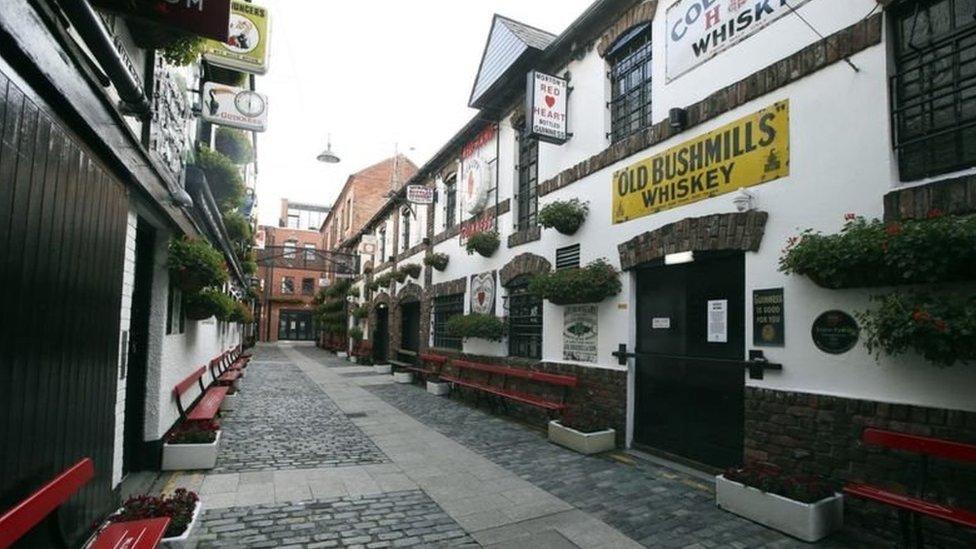
Covid-19 restrictions in Northern Ireland will be extended for one more week with a partial reopening of some sectors next Friday, in a compromise reached by the executive.
A proposal from DUP Economy Minister Diane Dodds was supported by the Ulster Unionists and Alliance.
Sinn Féin voted against the move and the SDLP abstained.
It means close contact services and unlicensed premises can reopen on Friday, 20 November.
Hair and beauty salons and driving instructors will reopen, by appointment, next Friday.
Hospitality will reopen on a "graduated basis", with unlicensed premises such as cafes and coffee shops also opening on 20 November, but with a closing time of 20:00 GMT.
Alcohol cannot be purchased or consumed on such premises.
Pubs and bars will be permitted to sell sealed off sales on 20 November.
Restaurants, pubs and hotels can reopen on 27 November, as the rest of the Covid-19 restrictions introduced on 16 October will expire at midnight on 26 November.
The current restrictions came into effect on 16 October and were due to expire at midnight on Friday, with ministers under pressure to make a decision.
The latest paper, brought by the DUP after several days of disagreement, was signed off late on Thursday afternoon.
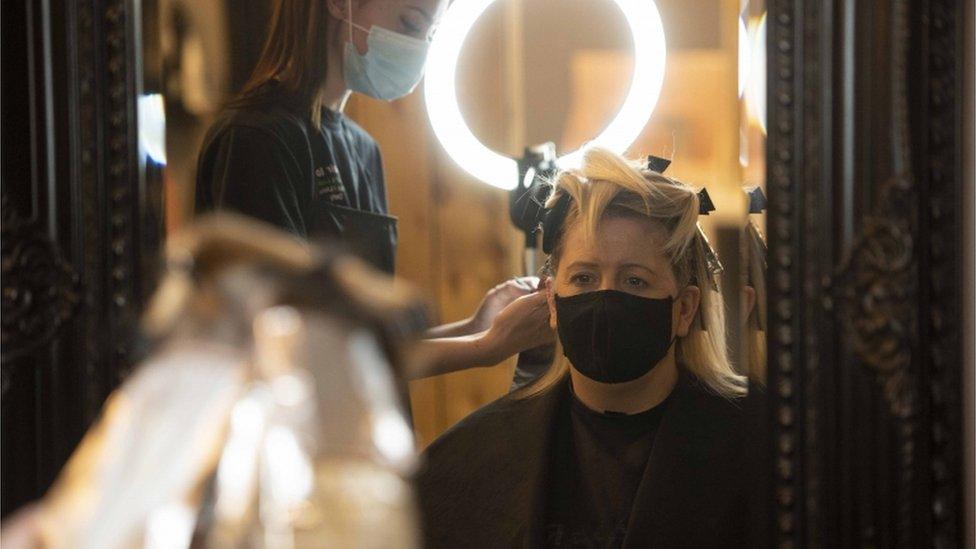
Close contact services including hair salons will reopen, by appointment, on 20 November
The document agreed also says that support will be provided for mitigations to reduce risk within the hospitality sector, including improved ventilation and requirements for the recording of customer information for contact tracing purposes.
The executive said a vaccination programme will be rolled out from as early as possible in December in line with England, initially targeting priority groups such as health care staff, care homes and those with underlying vulnerabilities.
Justice Minister Naomi Long said she was reconsidering her position in the Northern Ireland Executive over its handling of the Covid restrictions.
Why had ministers been at odds?
Sinn Féin, the SDLP and Alliance initially supported a proposal from Health Minister Robin Swann to extend all Covid-19 restrictions for another two weeks, but it was blocked by the DUP, who put it to a cross-community vote.
It is a mechanism that can be deployed on any issue in the executive, if three or more ministers ask for a vote to be taken on that basis, effectively giving parties with enough ministers a veto.
The NI Executive is made up of five parties that operate in a mandatory coalition, sharing power between unionist and nationalist parties, and the cross-community Alliance Party - tensions had been flaring between ministers throughout the four days of meetings.
A separate proposal put forward by Mr Swann, suggesting a one-week extension, was also blocked on Wednesday.
The DUP had been calling for firm dates to be announced for other sectors to reopen, but other parties argued providing concrete dates to businesses during an unpredictable pandemic would be "unfair".
Talks continued between the parties on Thursday over a hybrid proposal merging the one-week extension with a partial reopening of sectors the DUP had been calling for.
What have the parties said?
Sinn Féin Deputy First Minister Michelle O'Neill said she could not "in good conscience" support the plan.
She told BBC Newsline that only imposing one more week of restrictions "potentially means we're coming back to this situation before Christmas".
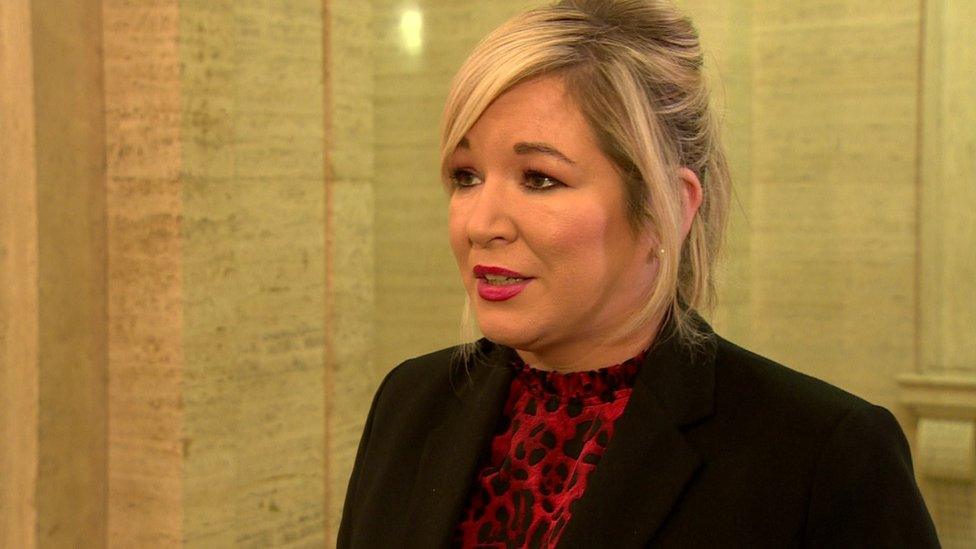
Sinn Féin Deputy First Minister Michelle O'Neill said she could not "in good conscience" support the plan
"We had strong advice from the chief medical officer and that should have been adhered to."
Economy Minister Diane Dodds said what the DUP had tried to do in their proposal "is to bring certainty to people in their lives in the run-up to Christmas".
"We have tried to bring forward a proposal that is balanced, that is proportionate and which the health minister supported, because that is the only way forward for an executive of five parties," she said.
Mrs Dodds added: "We cannot have a situation where we simply just open up business, close down business, open up business and we keep that in a perpetual cycle."
She later told BBC One's The View programme that she did not believe the executive had "covered itself in glory".
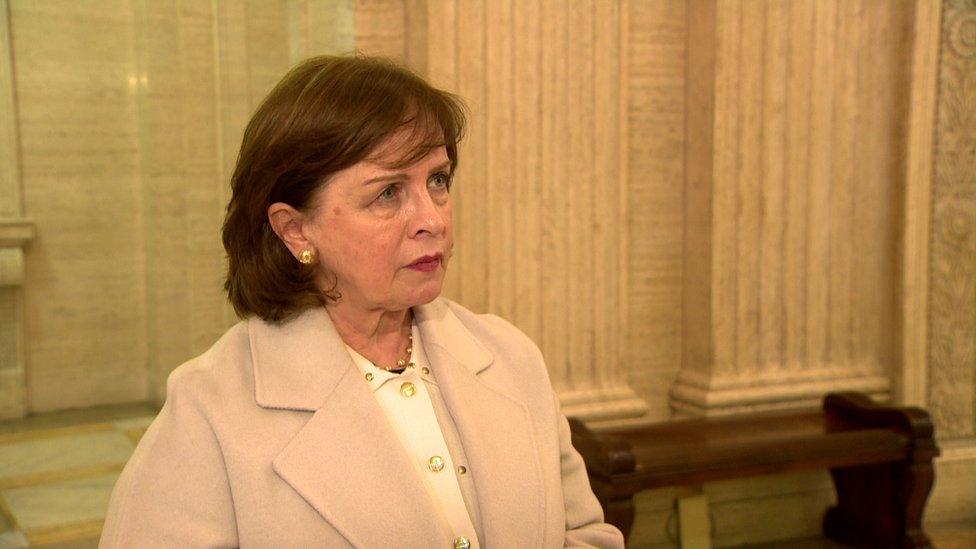
Economy Minister Diane Dodds the DUP has tried to 'bring certainty to people'
In a tweet, DUP leader and Northern Ireland's First Minister Arlene Foster said a "fair and balanced agreement" had been reached with the support of the health minister.
Allow X content?
This article contains content provided by X. We ask for your permission before anything is loaded, as they may be using cookies and other technologies. You may want to read X’s cookie policy, external and privacy policy, external before accepting. To view this content choose ‘accept and continue’.

SDLP Infrastructure Minister Nichola Mallon abstained on the vote as she said she feared it could lead to more restrictions just before Christmas.
"People were crying out for a decision," she said.
"And I'm being honest, I could support the extension for the one week, I could support additional finances going to businesses, but I couldn't support the partial reopening in the second week, and the best way and most honest way for me to reflect that was by abstaining on the vote."
'Urgent reform needed'
Ulster Unionist leader Steve Aiken said: "That an agreement that could have been reached over a week ago has finally been achieved this evening is hardly a startling example of good and effective government."
He added: "The lack of leadership from the Executive Office, the leaking and the briefing, as well as the use of cross-community voting within the Executive on matters that are anything but, further reinforces our belief that the system of government here needs urgent reform."
Traditional Unionist Voice (TUV) leader Jim Allister said it had been "an embarrassing week of misgovernment".
How have businesses reacted?
Chief Executive of Belfast Chamber, Simon Hamilton, described the wrangling at Stormont as an "embarrassing mess".
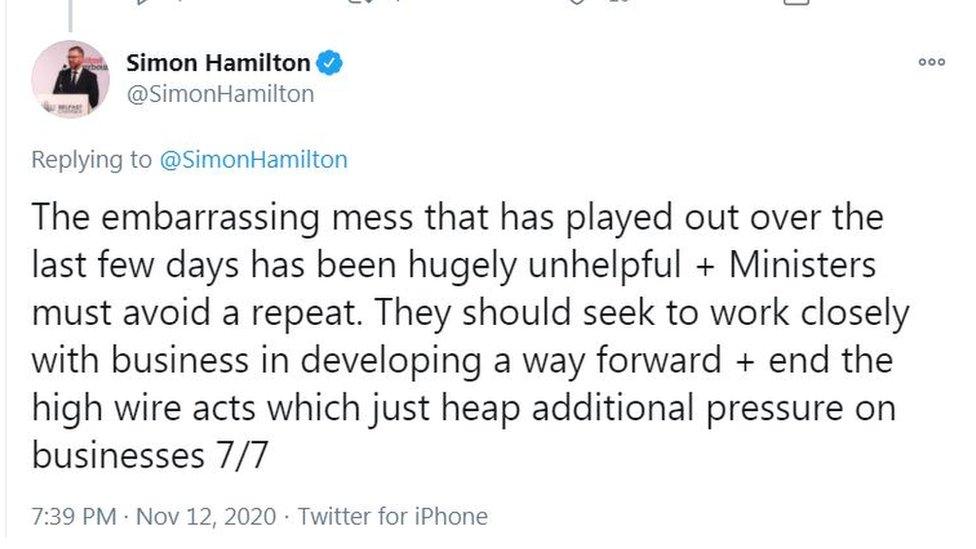
Janice Gault from the Northern Ireland Hotels Federation told BBC One's The View programme that 35% of hotel rooms in Northern Ireland had been booked this weekend.
She said 3,000 phone calls had to be made on Thursday after the Executive made a decision to keep hotels closed for two more weeks.
She added: "What many people forget is we had brides who are getting married this Saturday on the phone this afternoon asking could they get married."
Allow X content?
This article contains content provided by X. We ask for your permission before anything is loaded, as they may be using cookies and other technologies. You may want to read X’s cookie policy, external and privacy policy, external before accepting. To view this content choose ‘accept and continue’.

Colin Neill of Hospitality Ulster said he hoped the announcement would "result in thousands of jobs and businesses being saved".
"While pubs and restaurants may be closed, the bills continue to mount on a daily basis therefore extra financial support is needed now to protect businesses and jobs and we hope that the NI Executive will be swift in getting this money into bank accounts."
Retail NI Chief Executive Glyn Roberts said the package of restrictions was "far from perfect" - but welcomed that a decision had been taken.
"This decision provides a roadmap for the reopening of our high streets for the Christmas period and increased footfall for local retailers," he said.
'Dire position'
However, Bill Wolsey, who owns the Beannchor Group, said the decision came "late in they day" and was "hugely disappointing".
He said the hospitality industry is now "in a dire position", and it was costing his company £30,000 a week in wages to stay closed.
He said being open at Christmas is "hugely important".
"That's not only for my company, but for the whole of our industry - we use that money we make in December to sustain us through January and February, which are very quiet months. That's why we're so concerned about on what basis we'll be allowed to open."
Claire Blackadder, a hairdresser from Newry, told BBC Radio Ulster's Evening Extra the announcement her business could reopen next Friday was "absolutely brilliant".
"At least now the ball is rolling in that regard, we just need finance now and we are good to go," she added.

This week was a hard lesson in how not to deal with the coronavirus pandemic.
What we have seen is a slow moving, five-party government trying to deal with a fast-moving situation, and it was quite clear this week that they failed on all fronts, given the level of frustration among the public.
Despite the fact that there is now an agreement in place, few people are pleased with what is on the table.
The big loser in all of this is the public messaging - while our politicians spent a lot of time and energy trying to convince each other about what was the right thing to do, they lost valuable time trying to convince the public that they need to comply with regulations.
Health Minister Robin Swann has made it clear that if he feels there needs to be a review in the next fortnight, he will be prepared to bring a recommendation for further restrictions to the executive table, so pubs and restaurants may not be out of the woods just yet.
While pubs and restaurants might be circling 27 November on their calendar, they also know that there is a possibility they may not get to that point without further intervention.

In other coronavirus developments in Northern Ireland:
Businesses express fury at 'shambolic' Stormont stalemate
Shutdown deadlock at Stormont was 'politics at its worst' says a business group
Three of NI's five health trusts cancel planned surgery
Justice Minister Naomi Long says she has been reconsidering her position in the Northern Ireland Executive over its handling of the restrictions.